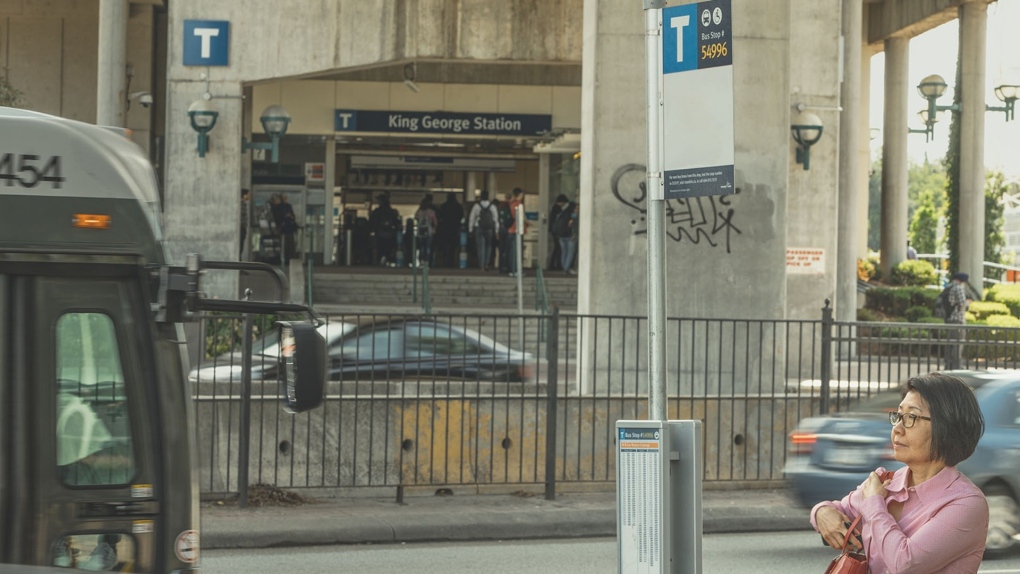King George SkyTrain station closed for 6 weeks
 King George SkyTrain Station in Surrey is seen in this photo from TransLink. (translink.ca)
King George SkyTrain Station in Surrey is seen in this photo from TransLink. (translink.ca)
King George SkyTrain Station closed Saturday morning and won't be open again for weeks.
The closure is necessary to complete "essential maintenance work," according to TransLink, which estimates the station will remain closed for "approximately six weeks."
That timeline would mean the station reopening sometime in mid-June.
The Expo Line's Surrey terminus will temporarily be at Surrey Central Station during the closure.
"A full station closure is required to complete these important upgrades as efficiently and safely as possible," TransLink said in a news release Friday.
"Some of the work will include removing parts of the rail to replace a turnout, a mechanical device that guides trains from one track to another. Over time, these components need replacement. This section of track has been in use since the station first opened 30 years ago."
The transit provider says repairs, inspections and cleaning are expected to occur inside the station during the closure.
Buses that usually stop at King George station will continue to do so, while buses that usually end at the station will proceed to Surrey Central. On weekday mornings between 6 and 9 a.m., additional buses will be added and will run every 15 minutes between King George and Surrey Central stations.
TransLink advises transit users who normally take the SkyTrain between King George and Surrey Central to build an additional 15 minutes of travel time into their schedules.
In 2021, King George Station was one of the 10 busiest in the SkyTrain network. It fell off the list in 2022, however, according to the most recent boarding data published by TransLink.
CTVNews.ca Top Stories

From outer space? Sask. farmers baffled after discovering strange wreckage in field
A family of fifth generation farmers from Ituna, Sask. are trying to find answers after discovering several strange objects lying on their land.
This iconic Canadian song is turning 50
Andy Kim's 'Rock Me Gently' is marking a major milestone, as it celebrates its 50th anniversary.
Oprah Winfrey: I set an unrealistic standard for dieting
Oprah Winfrey said on Thursday evening that she has long played a role in promoting unhealthy and unrealistic diets.
Prince Harry, Meghan arrive in Nigeria to champion the Invictus Games and meet with wounded soldiers
Prince Harry and his wife, Meghan, arrived in Nigeria on Friday to champion the Invictus Games, which he founded to aid the rehabilitation of wounded and sick servicemembers and veterans, among them Nigerian soldiers fighting a 14-year war against Islamic extremists.
Countries struggle to draft 'pandemic treaty' to avoid mistakes made during COVID
After the coronavirus pandemic triggered once-unthinkable lockdowns, upended economies and killed millions, leaders at the World Health Organization and worldwide vowed to do better in the future. Years later, countries are still struggling to come up with an agreed-upon plan for how the world might respond to the next global outbreak.
Toronto police called to Drake's Bridle Path mansion for another alleged intruder on Thursday
Toronto police say a man who allegedly attempted to access Drake’s Bridle Path property was taken to hospital on Thursday after an altercation with security guards.
Ontario family receives massive hospital bill as part of LTC law, refuses to pay
A southwestern Ontario woman has received an $8,400 bill from a hospital in Windsor, Ont., after she refused to put her mother in a nursing home she hated -- and she says she has no intention of paying it.
Flat tire on a highway? Here's why you shouldn't try to fix it
If you're cruising down a highway and realize you have a flat tire, you may want to think twice before stopping to fix it on the side of the road.
Storm-battered U.S. South is again under threat. A boy swept into a drain fights for his life
Dangerous storms crashed over parts of the U.S. South on Thursday even as the region cleaned up from earlier severe weather that spawned tornadoes, killed at least three people, and gravely injured a boy who was swept into a storm drain as he played in a flooded street.

































